Are you a first-time renter? Discover the top 5 tips to help you navigate the rental market like a pro.
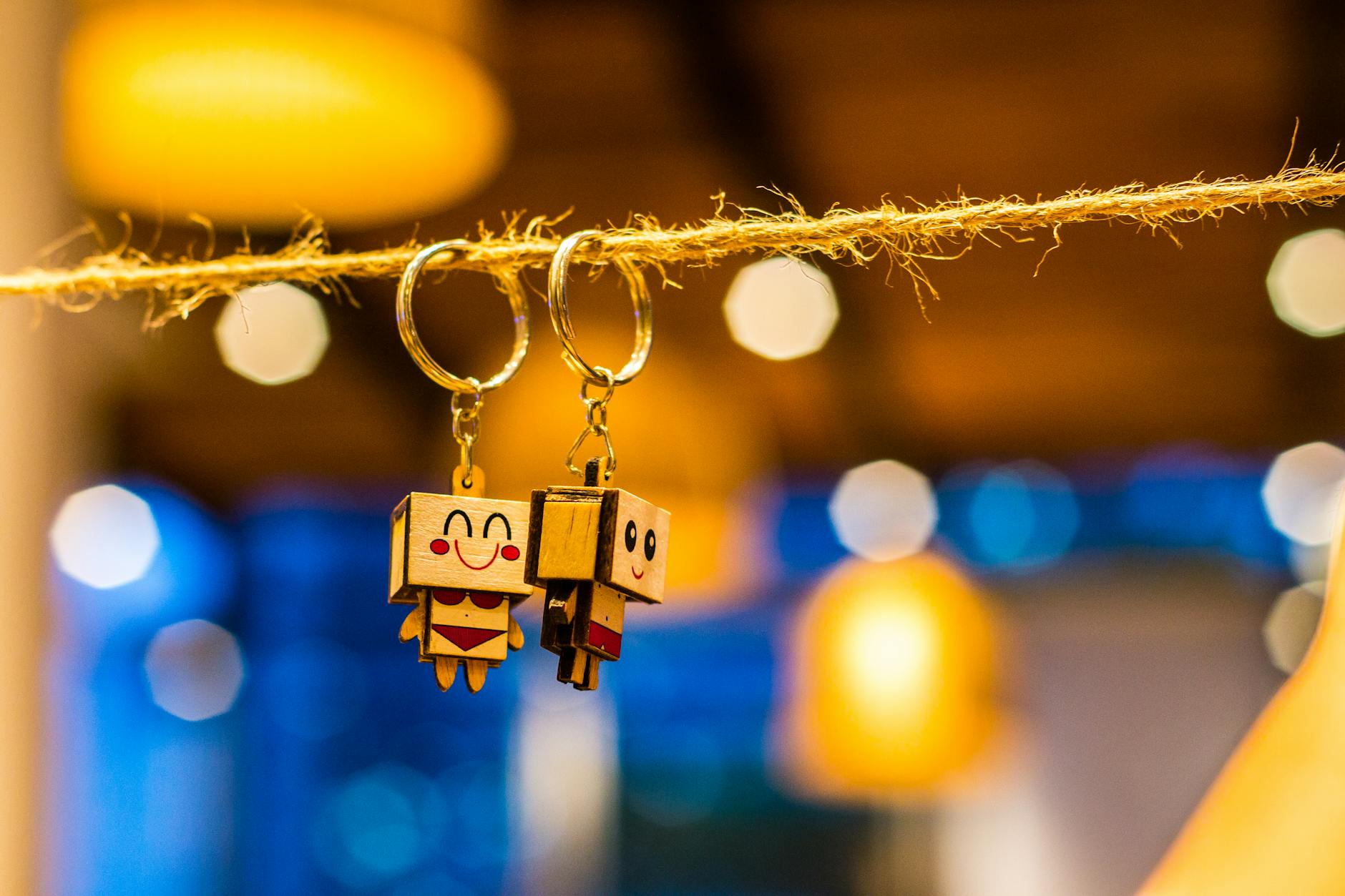
Image courtesy of THIS IS ZUN via Pexels
Table of Contents
- Introduction: Stepping into Your First Rental Home!
- Understanding Rental Agreements
- Budgeting for Your Rental
- Be a Smart Renter with Inspection Smarts
- Communication is Key
- Personalizing Your Space, Responsibly
- Staying Safe and Secure
- Neighbors and Community
- Moving In and Getting Settled
- Remembering Your Responsibilities
- Conclusion: Happy Renting!
- FAQs: All Your Questions Answered
Introduction: Stepping into Your First Rental Home!
Let’s talk about moving into your first rental place. We’ll share five big tips that’ll make it easy-peasy!
Are you ready to learn the ropes of being a first-time renter? Well, buckle up because we’re going to guide you through this exciting journey step by step!
From understanding your lease to budgeting for your rental home, we’ve got you covered with the best advice to ensure a smooth transition into your new space. Let’s dive in!
Ready to embark on this new adventure? Let’s get started!
Understanding Rental Agreements
Lease agreements, also known as rental agreements, are like blueprints for your rental home. They lay out all the important details that both you, the renter, and your landlord need to follow. Let’s take a closer look at what they’re all about.
What’s a Lease?
A lease is a legal document that outlines the terms and conditions of your rental agreement. It usually includes information like how much rent you need to pay, when it’s due, how long you’ll be renting the property, and what happens if either party breaks the rules.
Key Stuff in Your Lease
When you get your hands on a lease agreement, there are a few key things to pay attention to:
- The names of the tenant(s) and the landlord
- The rental term (how long the lease is for)
- The rental amount and due date
- Details on security deposits and fees
- Rules about pets, smoking, and other important clauses
Understanding these key components will help you navigate your rental agreement more smoothly and ensure that you’re on the same page as your landlord.
Budgeting for Your Rental
Money matters a lot when you’re renting your first place. It’s essential to plan your budget wisely so you can enjoy your new home without any financial stress. Let’s walk through some important tips to help you manage your expenses effectively.
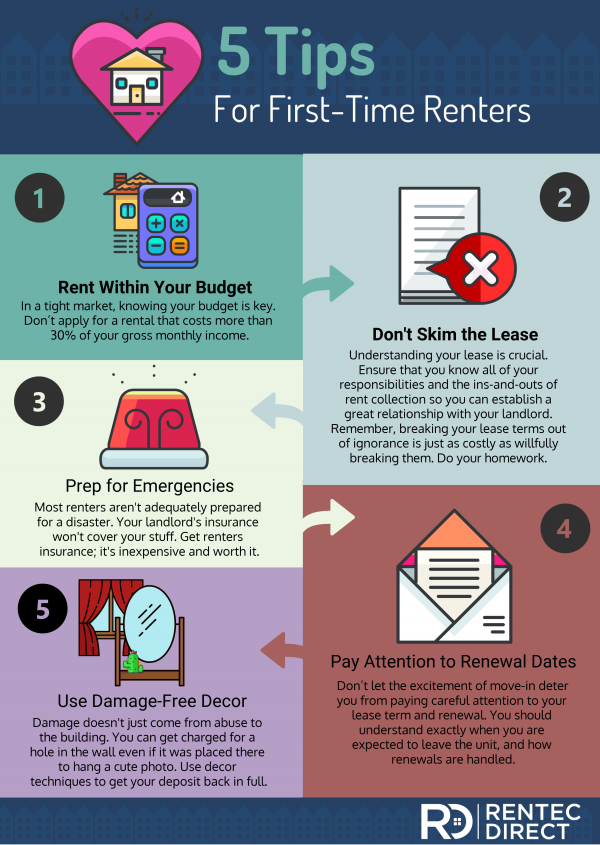
Image courtesy of www.rentecdirect.com via Google Images
Rental Costs Beyond Rent
When you rent a place, there are more costs than just the monthly rent. You’ll also have to consider utilities like electricity, water, and internet. Additionally, most landlords require a security deposit before you move in. This amount is usually refundable at the end of your lease if you’ve taken good care of the property. Understanding these extra expenses will help you budget more accurately.
How to Keep Track of Payments
To make sure you pay your rent and bills on time, it’s essential to stay organized. You can create a calendar or set reminders on your phone to notify you when payments are due. Consider setting up automatic payments for your rent so you never miss a deadline. By staying on top of your finances, you’ll avoid late fees and maintain a good relationship with your landlord.
Be a Smart Renter with Inspection Smarts
Before you move in, there’s this thing called an inspection. It’s kind of like a treasure hunt to find what needs fixing. Let’s get you ready for it!
Checking for Sneaky Problems
When you go for an inspection in your new rental place, keep your eyes wide open! Look out for things like leaky faucets, mold, creaky doors, or faulty switches. These sneaky problems might not be visible at first glance, so make sure to check every nook and cranny of your new home.
Making a List
Once you spot something that needs fixing during the inspection, grab a notepad and jot it down. Make a detailed list of all the issues you find, big or small. This list will come in handy when you talk to your landlord about making repairs. Being organized and thorough will show your landlord that you are a responsible renter.
Communication is Key
When you rent a home, communication with your landlord is super important. It might seem scary at first, but don’t worry, we’ve got your back! Let’s talk about how you can talk to your landlord like a pro.

Image courtesy of www.rentecdirect.com via Google Images
How to Talk to Your Landlord
Chatting with your landlord should be friendly and respectful. If you have any questions or concerns about your rental, don’t be afraid to reach out. You can call, send an email, or even have a face-to-face chat if you feel comfortable. It’s important to keep the lines of communication open so that any issues can be addressed promptly.
Asking for Repairs
If something in your rental needs fixing, don’t hesitate to let your landlord know. Whether it’s a leaky faucet, a broken door, or a malfunctioning appliance, your landlord is responsible for making repairs. Politely inform them of the issue and ask for a timeline on when it will be fixed. Remember, communication is key to ensuring that your rental remains a safe and comfortable place for you to live.
Personalizing Your Space, Responsibly
We all want to make where we live feel like our own special place, right? But when you’re renting, there are some rules to follow to make sure you don’t get in trouble. Let’s talk about how you can decorate your rental without causing any damage or headaches.
Decorations That Don’t Damage
When you’re renting, it’s essential to find ways to decorate your space without causing any harm. Instead of using nails to hang up pictures or shelves, try using removable adhesive hooks. They can hold things up without leaving any marks behind. You can also use washi tape or temporary wallpaper to add some color and style to your walls without needing to paint.
Knowing the Rules
Before you start personalizing your rental, make sure you understand what you can and can’t do. Your lease agreement might have specific rules about painting, hanging things on walls, or making any changes to the property. Some landlords might not allow certain alterations, so it’s crucial to know the guidelines and ask for permission if needed.
Staying Safe and Secure
When you move into your new rental, it’s essential to make sure your locks are secure. Check all the locks on your doors and windows to ensure they are functioning properly. If you have any doubts about the security of the locks, don’t hesitate to ask your landlord about the possibility of getting them replaced or rekeyed. This simple step can help you feel more secure in your new home.
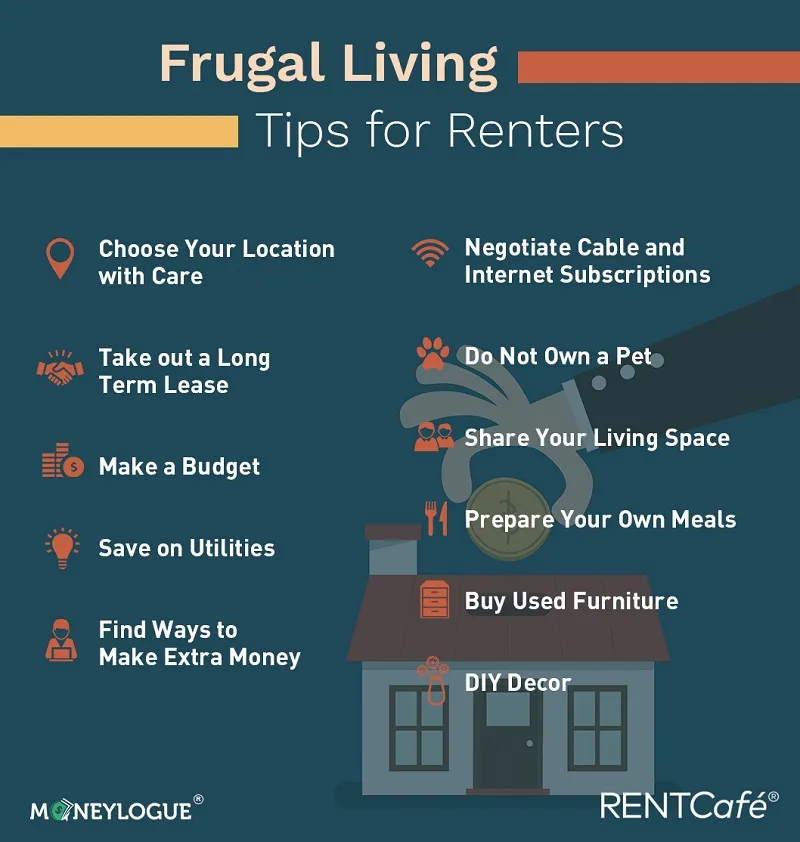
Image courtesy of www.rentcafe.com via Google Images
Who to Contact in Emergencies
It’s crucial to know who to contact in case of emergencies. In the event of a fire, break-in, or any other urgent situation, you should have the contact information of your landlord or property management company readily available. Additionally, familiarize yourself with the emergency services in your area, such as the number for the police, fire department, and medical services. Being prepared and knowing who to call in an emergency can help keep you safe and secure in your rental.
Neighbors and Community
Other people live around you, and we’ll talk about why it’s nice to get to know them and how they can sometimes help you.
Meeting Your Neighbors
Meeting your neighbors can be exciting! They’re the people you’ll see often, so it’s nice to say hello and get to know them. They can become your friends and maybe even help you out when you need it. So, don’t be shy to start a conversation when you see them around. Who knows, you might find a new buddy right next door!
Community Rules
Every community has rules to make sure everyone gets along and respects each other’s spaces. These rules might be about things like noise levels, parking, or shared areas like a pool or gym. It’s important to follow these rules so that everyone can enjoy living in the community peacefully. So, it’s a good idea to learn about these rules and follow them to be a good neighbor!
| Tip | Description |
|---|---|
| 1. Budget Wisely | Set a realistic budget by factoring in rent, utilities, groceries, and other expenses. |
| 2. Research Neighborhoods | Explore different neighborhoods to find one that fits your lifestyle and is safe. |
| 3. Understand the Lease | Read and understand your lease agreement to know your rights and responsibilities. |
| 4. Document Move-In Condition | Take photos and notes of any existing damages in the rental property to avoid disputes. |
| 5. Communicate with Landlord | Keep open communication with your landlord for any maintenance issues or concerns. |
Moving In and Getting Settled
Finally, the big day has arrived! It’s time to move into your new rental home. Expect a bit of chaos as you lug boxes and furniture into your new place. The landlord or property manager may meet you to hand over the keys and do a walkthrough to make sure everything is in good shape.
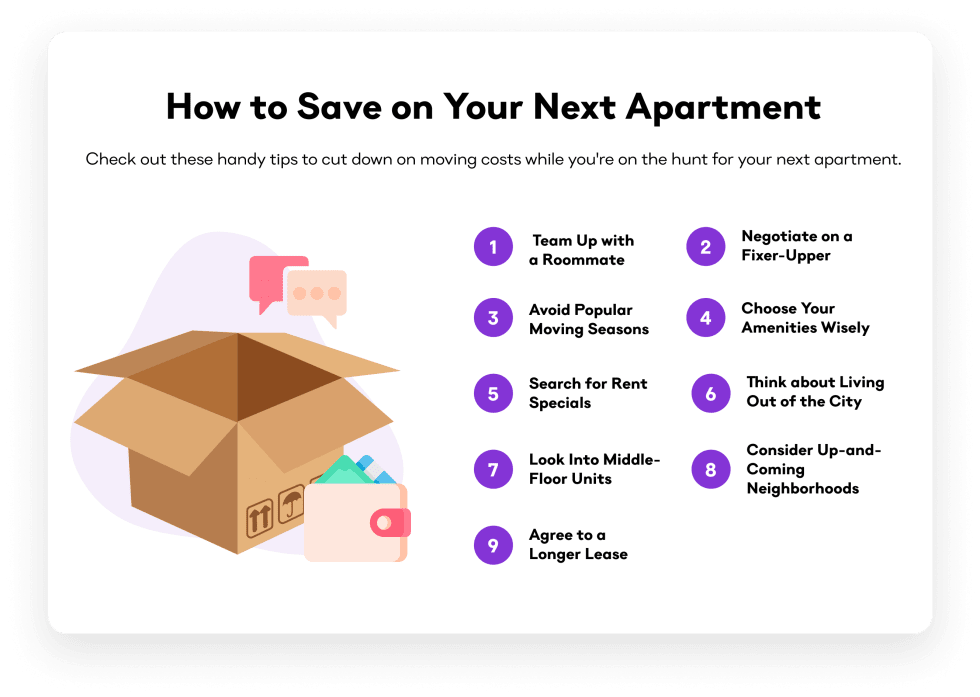
Image courtesy of www.apartmentlist.com via Google Images
Getting Comfortable in Your New Home
Now that you’re in, it’s time to make your rental feel like home sweet home. Start by unpacking essentials like bedding, toiletries, and kitchen supplies. Setting up your personal items and decorations will add your unique touch to the space, making it cozy and comforting.
Don’t forget to familiarize yourself with important features like the circuit breaker box, smoke detectors, and thermostat. Knowing how these work can help you stay safe and comfortable in your new place.
Remembering Your Responsibilities
With great power comes great responsibility, even for renters. It’s important to remember that renting a home comes with certain duties that you need to fulfill. Let’s dive into what you should always keep in mind to be a responsible tenant.
Taking Care of the Place
One of the most important responsibilities as a renter is to take care of the place you’re living in. Keeping your rental clean and tidy not only makes it a more pleasant space for you to live in but also shows respect for the property and your landlord.
Following Rules and Agreements
It’s crucial to follow the rules set in your lease agreement. These rules are there to protect both you and the landlord. By adhering to the terms of the agreement, you ensure that everyone’s rights are respected. Remember, sticking to the rules and agreements keeps not only your home in order but also fosters a positive relationship with your landlord.
Conclusion: Happy Renting!
We’ve journeyed through all the essential tips and tricks to make your first renting experience a smooth ride. By following these guidelines, you’ll be well-prepared to step into your new rental home with confidence.
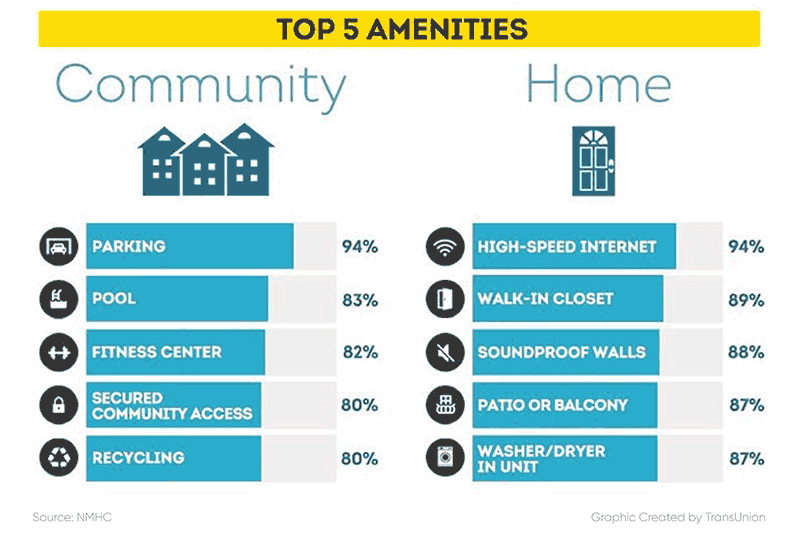
Image courtesy of www.mysmartmove.com via Google Images
Remember, being a renter comes with responsibilities, but with the knowledge you’ve gained from this guide, you’ll have no trouble managing your new place like a pro.
So, as you embark on this exciting adventure of renting for the first time, keep these leasing tips close at hand. Happy renting!
FAQs: All Your Questions Answered
What’s a Lease?
A lease is like a special agreement between you and the person who owns the place you’re renting. It’s a paper that says you can live there for a certain amount of time, like a year. So, remember to follow the rules in the lease so everyone stays happy!
Key Stuff in Your Lease
Your lease has important things you need to know. It talks about how much you need to pay every month, when you need to pay it, and what happens if you don’t follow the rules. Make sure to read it carefully and ask questions if you’re not sure about something!
Rental Costs Beyond Rent
When you rent a place, you don’t just pay rent. You also have to think about other costs like electricity, water, and maybe even internet. And don’t forget about the security deposit you might need to pay before moving in.
How to Keep Track of Payments
To make sure you never miss a payment, you can set reminders on your phone or computer. It’s also a good idea to keep all your bills in one place, so you always know what you need to pay and when.
Checking for Sneaky Problems
Before you move into your new place, take a good look around to spot any hidden problems. Check things like the faucets, lights, and doors to make sure everything works properly. If you find anything broken, let your landlord know so they can fix it.
Making a List
It’s helpful to make a list of things that need fixing before you move in. This way, you can show your landlord everything that’s not working properly. It’s like making a to-do list, but for your new home!
How to Talk to Your Landlord
If you need to talk to your landlord about something, just be polite and friendly. It’s okay to ask questions or share concerns. Remember, your landlord wants you to be happy in your new home, so they’ll usually be happy to help!
Asking for Repairs
If something breaks in your home, don’t be afraid to ask your landlord to fix it. Just send them a message or give them a call to let them know what’s going on. They’ll appreciate you telling them, so they can make things right.
Decorations That Don’t Damage
You can make your rental place look awesome without damaging the walls or floors. Use things like posters, tapestries, or removable hooks to add your style without leaving a mark. It’s a fun way to personalize your space!
Knowing the Rules
It’s important to follow the rules about decorating your rental space. Some landlords don’t allow certain things like painting walls, so make sure you know what’s okay. Always ask your landlord if you’re not sure!
Locks and Keys
Having good locks on your doors can help you feel safe in your new home. If you’re not sure about the locks or keys, ask your landlord if they can be changed. It’s better to be safe than sorry!
Who to Contact in Emergencies
In case of an emergency, like a fire or a flood, you should know who to call for help. Make sure you have important numbers saved in your phone, like the fire department or the police. It’s always good to be prepared!
Idaho Poperty Management
